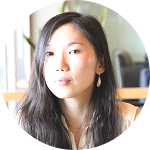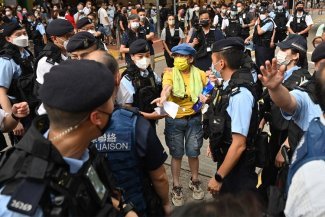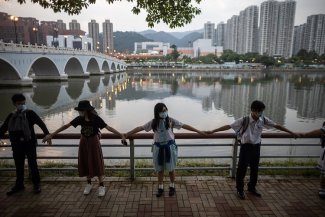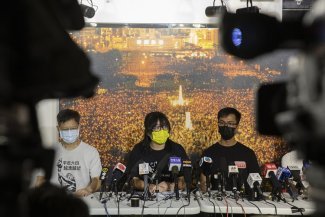A series of books about Chinese President Xi Jinping are retailed in a Hong Kong bookshop indirectly controlled by Beijing.
In a non-descript industrial building in a working-class area of Hong Kong, 10,000 books were cleared from a cubbyhole bookshop at the end of January 2024 as the small business closed its doors for the last time. Another compact bookstore, tucked away in a bourgeois-bohemian neighbourhood in west Hong Kong Island, will also pack away its curated book collection when it shuts down at the end of March.
Two bookshops, the same fate. But these are no victims of the Amazon bookselling monopoly. Instead, both of these outlets have a liberal disposition, which is believed to be the cause of their demise in Hong Kong, a city where freedom of expression is fast shrinking.
The first shop, Prejudice Bookstore, recently received a letter from the land authority ordering its closure on grounds of land use violation. Owner Samson Fan says: “Bookshops are now very ‘popular’ with the government. I feel we are being targeted.”
The second, Mount Zero, has received a litany of government missives warning or threatening to prosecute it over minor issues, such as a tiled platform outside of the premises. Popular and normally media-friendly, Mount Zero now shies away from journalists, but indicated in a social media post that it is fed up with the hassle.
All this is just one aspect of the many challenges confronting the book sector in Hong Kong.
For years, the former British colony had been home to a free and vibrant publishing industry. Books with almost any kind of content could be published here risk-free, and mainland Chinese tourists liked to visit independent bookshops in Hong Kong – which was known as “the paradise of banned books” – to snap up copies that had been banned or were unavailable on the mainland.
But today, publishing words in Hong Kong has become a risky business, and self-censorship is the norm. For authors, political topics such as the 2019 anti-government protest movement have become a taboo. Publishers censor potentially controversial content, while printers simply refuse to publish them. Bookshops have to be courageous to sell books with certain themes.
“We’re in an age of cultural decline. Some facts and information are leaving us,” says the owner of a decades-old bookstore who asked for anonymity.
National security trumps all
The year 2020 marked an inflection point for Hong Kong’s book sector, when the Chinese government imposed a sweeping national security law on the city, partly to crush the 2019 protest movement that challenged Chinese President Xi Jinping. The controversial law criminalises secession, subversion, terrorism and foreign collusion. Offenders face up to life imprisonment. Beijing says it has helped Hong Kong “move from chaos to stability and prosperity”, while critics say it has undermined the Asian financial hub’s fundamental political freedoms and civil liberties.
With the new legislation, Hong Kong finds itself in a new world.
So far, national security police have arrested approximately 290 people. About 90 of them, including dozens of politicians, have been prosecuted under the security law.
That is a tiny portion of Hong Kong’s population of 7.4 million, but the spectre of national security looms so large that the impact of the law is widespread. Now almost every aspect of life in Hong Kong can be related to national security.
Innocuous street graffiti has been erased because of national security concerns. Even a T-shirt landed the wearer three months in jail because the garment bore an 11-word slogan “capable of endangering national security”.
Meanwhile, the government has turned to a dormant colonial-era sedition law to arrest individuals, and top leader John Lee’s administration will soon enact a local security law to “comprehensively” address national security risks. In this new age of tightening controls, dissent is muted, and politics has become a highly sensitive subject to be dodged by many Hongkongers.
The importance of self-censorship
In the publishing world, the climate of fear often finds expression in self-censorship.
When publisher Raymond Yeung Tsz-chun of Hillway Culture was approached by an author with a manuscript about the 2019 protests, he expressed interest, whereas most other local publishers gave it a pass. Still, Yeung practised a certain degree of censorship by telling the author to give the police a voice in the book, instead of zeroing in on protesters’ point of view. Eventually the author withdrew the manuscript.
“I know that was very unfair to the author. Unfortunately, that’s the status quo in Hong Kong,” says Yeung, a former schoolteacher. “There have been many times where authors have come to us with manuscripts but gave up after we told them the potential risks.”
For publishers, the pressure is immense as they face both the financial and political consequences. Yeung explains: “We are gatekeepers as well as investors. Even if we think a book carries no legal risk, the printer may find it dangerous and refuse to print it. If it gets printed, some bookshops may not want to sell it and distributors may pull out from the deal.”
The prevalent self-censorship is prompted by the broader political atmosphere in post-national security law Hong Kong, but also a spate of incidents in the book scene. Over the past three years, public libraries have quietly removed hundreds of books due to national security concerns. They include all books about China’s Tiananmen Square crackdown in 1989, and titles by prominent pro-democracy figures such as Joshua Wong and Margaret Ng. Government officials have said the books are not banned but have to be reviewed. Additionally, the jailing of five speech therapists in 2022 over a series of “seditious” children’s books they produced, as well as the prosecution of pro-democracy media mogul Jimmy Lai under the national security law and the forced closure of his popular newspaper Apple Daily in 2021, have alarmed many in the industry.
Since 2020, a growing number of publishers in Hong Kong have shut down or left the city. But Hillway Culture, founded in 2016, had until recently continued to publish politically sensitive titles. Yeung, who was struck by a police projectile that left him partially blind during a protest in 2019, believes books are an important part of the cultural fabric of a society. “When a place has fewer and fewer types of books, its cultural landscape will become sterile,” he says.
But for all his tenacity, Hillway Culture had to close down on the last day of 2023 due to the departure of a core team member, a young man who is Yeung’s former student.
“I have no confidence in finding someone else who can do the job. It’s a high-risk business. Some people might want to take the job, but I wouldn’t want them to worry everyday…[.] This is not a healthy environment to be in,” he says.
Bookshop boom and gloom
Strangely, despite all the challenges – and the fact that Hongkongers are not known to be avid readers – a new crop of independent bookshops have sprung up in recent years, instilling changes to a sector dominated by several bookstore chains indirectly controlled by Beijing.
The phenomenon intrigued Ben Cheng Tsu-bang, associate professor of political sociology at Fo Guang University in Taiwan. According to his research, the number of independent bookshops in Hong Kong, excluding bookstore chains, rose from 45 to 87 between 2019 and 2022. Cheng believes the boom is a response to the political controls emanating from the security law regime.
“Sure, the motive behind a person’s action can be very complicated. The bookshop owners have to make a living, too. But with the national security law, they have to adapt, self-censor and all that. It takes some courage,” Cheng says. “This makes them very different from other independent bookshops in the world.”
Many of these newcomers sell sensitive titles increasingly hard to find in Hong Kong, including books about Hong Kong’s decades-long pro-democracy movement. Books about authoritarianism such as George Orwell’s 1984 are typical items, too. A good number of the shops also host community events to connect people in a city where many civil groups have disbanded.
A case in point is Have A Nice Stay, which has been organising various cultural talks and workshops since its inception in 2022. Co-founder Sum Wan-wah, a former journalist, says: “There are fewer civil groups now and fewer things happening. Bookshops can hold events to keep alive community discussions on social issues.”
Yet things are not smooth sailing. Of late, independent bookshops have been frequently inspected by different government departments. Some inspections are conducted in the name of regular checks and others stem from complaints. Have A Nice Stay has been inspected by about five official bodies in the last two months, including the tax and labour authorities. Mount Zero has claimed that government departments send them warning letters every week. Another bookshop, Book Punch, which opened in 2020, was inspected by six government bodies 10 times in the space of 15 days in December. Some pro-democracy enterprises in other sectors, such as cafés and restaurants, also complain of getting similar treatment.
Government departments contacted by Equal Times would not comment on individual cases. The tax authority, for example, says it carries out onsite inspections of businesses from time to time.
Sum does not want to speculate on whether the government is targeting a certain type of bookshop, but he notes that since it opened, his shop has been the subject of many anonymous complaints, including false accusations that it sells drinks illegally. “Things like that distract us a bit, but not to an extent that we have to fold,” he says.
Samson Fan of Prejudice Bookstore is undaunted, too. Less than a week after the bookshop’s closure, Fan found a new site –albeit even smaller – in a shopping mall nearby and reopened the shop. “The actual impact of the inspections and harassment is not that significant. It depends on how bookshop owners take it. Some are fed up and call it quits. Others persevere and stay in the game,” he says.
Keep the flame burning
Meanwhile, some citizens are using unconventional means to rescue Hong Kong’s book sector. Since the security law was enacted, schoolteacher Sung Chor-on has been building a collection of books that have disappeared from public libraries along with other sensitive titles. To date he has gathered some 600 copies, all kept in a storage facility that he rents and are available for borrowing. He cherishes the collection, believing that many titles will never be reprinted. “They’re more important than my job. If I lost my job, I could become a taxi driver or something. But if these books were gone, they’d be gone forever,” he says.
Separately, entrepreneur Kin Ko has just launched a campaign where he will partner with independent bookshops to sell at least one copy of each book published in Hong Kong this year. “It may sound cliché, but many little drops make an ocean,” he says.
The question, though, is how many new books will be published in a place where writers, publishers and printers are in self-censorship mode? A veteran publisher who does not want to be identified says there is never an official record on the number of books released in Hong Kong. But according to Yeung, both the genres and number of books published in Hong Kong are shrinking, and some local authors now turn to publishers in Taiwan to avoid censorship.
Will Hong Kong become a city with no shortage of bookshops but few books of its own? Yeung says he is ever the optimist. “Throughout history, there have been many people who lived in harsh situations and wrote great books. Through suffering, one may have the will to write things of historical significance.”













